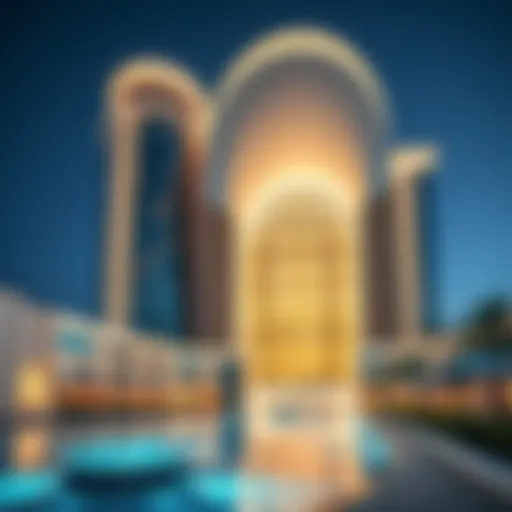Iftar Timing and Cultural Insights in Dubai 2023
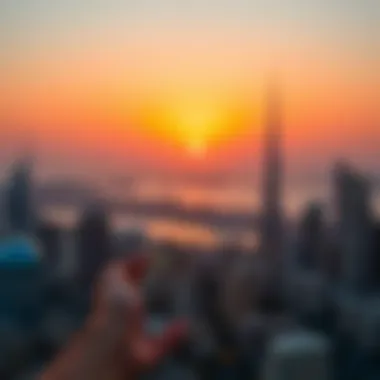

Intro
In the vibrant city of Dubai, Ramadan is not merely a month of fasting; it embodies a unique blend of cultural tradition and modern living. As the sun dips below the horizon, the call to prayer resonates through the city, signaling the cherished moment known as iftar. This breaking of fast is laden with significance, transforming mundane evenings into moments of gathering, communion, and gratitude.
Beyond the spiritual essence, iftar also punctuates the daily routines of residents and visitors. The way this moment is observed—its timing, local customs, and the culinary delights that accompany it—offers profound insights into the city’s lifestyle during the holy month. The interplay of traditional practices with contemporary advancements, particularly within Dubai’s bustling market environment, adds another layer of intrigue.
For many, this period is also a noteworthy time to explore real estate opportunities amidst a backdrop of communal activities. The timing of iftar can influence local social dynamics, which ultimately affects property values and investment trends. Understanding these nuances provides a more robust perspective for homebuyers, investors, real estate agents, and expatriates navigating this unique market.
A deeper plunge into the iftar experience reveals the intricate relationship between cultural practices and the economic landscape, particularly how various community gatherings evolve during this time. As this article unfolds, readers will gain a comprehensive understanding of how iftar shapes daily life, while also examining the changing dynamics in Dubai's thriving real estate sector within the context of Ramadan 2023.
Understanding Ramadan
Ramadan is much more than just a month of fasting; it embodies a deep spiritual journey for Muslims around the world. This period is not only vital for personal growth but also enriches communities through shared experiences and practices. Understanding the significance of Ramadan provides a clearer insight into the timing of iftar—the meal that breaks the fast each day. In a city as diverse as Dubai, where culture and modernity intertwine, Ramadan takes on unique flavors and traditions.
Historical Context
Ramadan's roots reach far back into history. The month is believed to have been established in 610 A.D. when the first verses of the Quran were revealed to the Prophet Muhammad. This initial event marked a pivotal moment, transforming the spiritual landscape of Arabia and beyond. The observance of Ramadan has since evolved, melding historical practices and local customs that reflect the rich tapestry of Islam.
In Dubai, the historical significance of Ramadan can be seen in the rituals celebrated at community centers, mosques, and residences. Traditionally, people engage in various acts of worship, including increased prayer and Quran recitation. For instance, the Taraweeh prayers, which are special nightly prayers conducted during Ramadan, represent a centuries-old practice designed to deepen faith and community spirit. Understanding this historical context enriches one's appreciation of how Ramadan is observed today, particularly during iftar timings.
Cultural Significance
Culturally, Ramadan serves as a focal point for social cohesion. Communication and interaction intensify between individuals, families, and neighborhoods. People come together to share meals once the sun sets; laughter and stories fill the air. This communal aspect enhances the emotional and spiritual bond among community members.
In Dubai, you can see this cultural significance flourish in many ways. From traditional iftar gatherings at hotels, like the luxurious Burj Al Arab, to intimate family gatherings at home, each meal manifests a sense of belonging and hospitality. The act of inviting others to share in your meal is a deep-rooted tradition; it fosters goodwill and strengthens communal ties.
Moreover, the cultural elements of Ramadan—like wearing traditional attire during iftar or preparing specific dishes—reflect the richness of Emirati identity. The month also serves as a reminder of empathy and compassion; it's a time when people are encouraged to engage in charity and community service.
"Ramadan awakens a deep-rooted cultural tapestry, binding individuals through shared traditions and rituals."
In essence, understanding Ramadan within the context of history and culture not only enhances the observance of iftar but also deepens the social fabric of a city known for its cosmopolitan character. The significance of this holy month extends beyond mere tradition—it encourages reflection, compassion, and communal togetherness. Establishing such insights complements the broader themes of lifestyle and real estate considerations tied to Ramadan in Dubai, making it an essential subject of discussion.
Iftar Timing in Dubai
Iftar, the meal that breaks the fast during Ramadan, holds significant meaning for the Muslim community and serves as a central moment in the day during this holy month. Understanding the timing of iftar in Dubai offers insights not just into the spiritual aspect of Ramadan but also into how societal structures adapt to this cherished tradition. The flavors of iftar aren't merely gustatory; they are woven into the fabric of the city’s cultural identity.
For residents and visitors alike, knowing when to observe iftar can enrich the experience, allowing everyone to partake in communal gatherings, culinary traditions, and the spirit of the season. The break of fast at sunset, marked by the adhan, or call to prayer, is a moment that combines reverence and festivity.
Official Prayer Times
Dubai’s skyline and bustling streets are often in a state of flux, but during Ramadan, the added element of time becomes even more critical. The official prayer times are published daily, usually available through mosques or various apps. These times not only signify the moments of prayer but also inform when iftar occurs.
The official iftar timing in Dubai shifts slightly as Ramadan progresses due to the nature of the lunar calendar.
- As an example, the iftar time may start around 6:45 PM at the beginning of the month, but can extend to as late as 7:00 PM as the month goes on.
- Thus, timely awareness is necessary—missing the call to prayer means missing out on the breaking of fast!
It is not uncommon to see groups gathering outside mosques or public squares, preparing to seize the moment as the sun dips below the horizon. Knowing the official prayer times is essential for anyone residing or visiting Dubai, ensuring they share in the communal spirit that iftar invokes. Additionally, many hotels and restaurants often align their offerings with these timings, making it easy for guests to partake.
Influence of Technology on Timing
In today’s world, technology plays a pivotal role in how Muslims observe iftar. Mobile applications have revolutionized the way people keep track of prayer times.
Platforms such as Muslim Pro or IslamicFinder provide accurate timing based on geographical location, ensuring that residents, including newcomers and expatriates, don’t miss the evening meal. The convenience of these tools cannot be overstated; they serve as a lifeline during a month when every moment holds significance.
Moreover, social media platforms like Facebook and Instagram see an uptick in local businesses promoting iftar options, inviting the community to enjoy traditional dishes. This environment fosters both engagement and opportunity, as restaurants and family kitchens alike share their best dishes digitally.
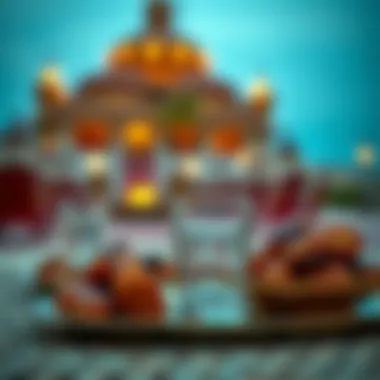

"In a fast-paced city like Dubai, technology can be the bridge between tradition and modernity, making time management a breeze during Ramadan."
Technology not only enhances the observance of iftar but also actively integrates it with Dubai's cosmopolitan lifestyle, allowing for a blend of cultural richness and convenience.
As individuals embrace these modern tools, the essence of iftar remains steadfast, serving as a reminder of communal bonds and shared experiences.
Traditional Iftar Foods
When the sun dips below the horizon during Ramadan, the anticipation for iftar— the evening meal that breaks the fast— reaches a fever pitch. In Dubai, the traditional iftar foods reflect not just culinary heritage but also community spirit, drawing people together from all walks of life. This section examines the essence of what is served during iftar, the cultural relevance, and the flavors that mark this special time of year.
Popular Dishes in Dubai
In the bustling city of Dubai, iftar meals are more than just sustenance; they are a celebration of flavors. Some popular dishes that grace tables during this time include:
- Dates: Traditionally, the fast is broken with dates and water, a practice rooted in the Sunnah of Prophet Muhammad. Fresh and often stuffed with nuts, they pack a nutritious punch, making them a staple.
- Harees: This dish, made from wheat and meat, symbolizes the communal aspect of iftar. Often cooked in large batches, it brings families and friends together, reminding everyone of their shared values and warmth.
- Fattoush and Tabouleh: These salads, bursting with fresh herbs and vegetables, offer a refreshing contrast to heavier dishes. They are often garnished with pomegranate seeds for a touch of sweetness.
- Grilled Kebabs and Shawarma: These meats, marinated and grilled to perfection, evoke the scents of Dubai’s streets. They are typically served with flatbreads and a variety of dips, adding to the feast's zest and flavor.
"Breaking bread together symbolizes affection and unity in diverse cultures. In Dubai, iftar is where culinary delights reflect the spirit of Ramadan."
This variety not only satisfies diverse palates but also highlights Dubai's multicultural identity, making iftar a culinary tapestry woven from local and international influences.
Unique Culinary Experiences
The culinary journey during iftar in Dubai offers unique experiences that extend beyond the plate. Several establishments elevate the iftar experience through specially curating menus and environment designed to enhance the communal aspect of the meal:
- Iftar Buffets: Many high-end hotels like the Burj Al Arab and the Atlantis, The Palm host lavish buffets, featuring an array of dishes that blend traditional flavors with modern culinary techniques. Guests can savor everything from Arabic sweets to international cuisines.
- Cultural Nights: Some restaurants organize thematic iftar evenings, where local musicians play traditional music, and dancers perform while patrons indulge in iftar. These events provide deeper cultural understanding alongside the meals.
- Outdoor Tents: In the heart of the city, lavish tents are set up, transforming public spaces into beautiful communal dining venues. Sharing iftar in such settings promotes a strong sense of community and togetherness.
- Charity Initiatives: Some establishments place a special emphasis on giving back during Ramadan. They set up communal tables where anyone can partake in iftar, often offering meals at no cost to low-income families and migrant workers, creating a profound impact on the community.
In essence, the experience of iftar in Dubai goes beyond merely eating; it enriches community ties, honoring traditions while adapting to contemporary life, echoing the evolving heartbeat of this vibrant city.
Community Gatherings During Iftar
Iftar time in Dubai resonates with energy and a sense of belonging, making community gatherings a central aspect of the month. These gatherings offer a break from fasting and create a warm atmosphere where people can connect with family, friends, and the wider community. Whether at home or in public spaces, the act of coming together to share food is a reflection of the strong communal ties that characterize life in this bustling city.
Family and Friends
Breaking fast with family and friends is not just a tradition; it's a cherished ritual. As the sun dips below the horizon, families gather around dining tables laden with an array of traditional dishes. The sound of laughter, shared stories, and the clinking of cutlery add to the ambiance of togetherness. In Dubai, many expatriates struggle with homesickness, and gathering for iftar becomes a means of bridging that gap, often resembling a potluck where each family brings a dish, contributing to a diverse feast.
This practice of sharing extends beyond the immediate family. Neighbors often invite each other over, encouraging a spirit of camaraderie. The inclusiveness of such gatherings creates new friendships and deepens existing ones. Families may struggle to keep the same schedule throughout the month, but the anticipation of iftar ignites a sense of shared purpose. To savor meals together enhances not only the flavors but also the bonds that connect them.
"Sharing the simple act of breaking bread can transform strangers into friends, especially during Ramadan."
Public Iftar Events
Public iftar events in Dubai have surged in popularity, becoming a hallmark of Ramadan celebrations. Local mosques and community centers often host these gatherings, allowing residents from various backgrounds to partake in the spirit of Ramadan. They typically provide not only delicious meals but also include cultural performances and activities that enhance the experience.
These events serve a dual purpose: they facilitate social interaction and embody the charitable essence of Ramadan. Individuals and organizations sponsor iftars, ensuring that everyone, regardless of their financial situation, can enjoy a meal. It’s common to see large tents filled with tables set for hundreds, echoing with laughter and conversation.
Public iftar events also promote understanding and harmony among diverse communities. With Dubai's melting pot of cultures, these gatherings showcase the rich culinary tapestry of the city, featuring dishes from around the world—spanning from Arabic favorites like sambusas to Indian biryanis and Pakistani kebabs. For expatriates, it’s also an opportunity to introduce their traditional dishes, further diversifying the menu.
As we look at these gatherings, a few key aspects emerge:
- Inclusivity: Open to all, they break down barriers and foster friendships across different cultural backgrounds.
- Charity: Many events include donation drives for local charities, reinforcing the spirit of giving that is central to Ramadan.
- Cultural Exchange: Participants can learn about different cultures through food and interaction, enriching the understanding among diverse groups.
In summary, community gatherings during iftar elevate the experience of Ramadan in Dubai. They exemplify unity, strengthen bonds, and create lasting memories for residents and visitors alike.
Impact on Daily Life
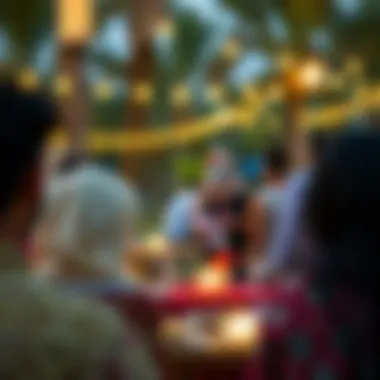

The observation of iftar during Ramadan significantly influences daily life in Dubai, a city where modernity intertwines with tradition. Understanding this impact encompasses more than just the timing of meals; it delves into schedules, social structures, and the very rhythm of urban life. This section highlights how the holy month affects various facets of existence for residents, creating a unique blend of cultural practices and daily routines.
Work and School Schedules
As the sun dips below the horizon, signaling the end of the fast, the city transforms into a hub of activity. Work and school schedules undergo considerable adjustments during Ramadan. Many offices adopt flexible hours, allowing employees to leave earlier in order to return home for iftar. This shift is especially important as it respects and honors the commitment individuals make to observe the fast.
- Office Hours: Many organizations opt for a shortened workday. Typically, hours might shift from 9 AM to 3 PM, allowing staff to complete essential tasks while ensuring they can partake in their evening meals with loved ones.
- School Timings: Schools often consider the fasting schedule as well. Classes might start a bit later in the morning, giving students the opportunity to arrive after a fulfilling iftar. This adjustment is not just practical; it reflects a communal respect for the Ramadan experience.
- Break Policies: Breaks during work hours might increase in length, or extra breaks are provided to facilitate hydration prior to iftar. This change ensures that employees remain productive while accommodating the fasting conditions.
"In Ramadan, our work tempo shifts. It’s not just about getting things done; it’s about balancing faith and professional life together." - A local office manager.
For many expatriates, adjusting to the local customs during Ramadan can be a learning curve. Understanding these shifts is crucial for integration and respect towards their local colleagues. Familiarity with how businesses operate during this month can ease the anxieties surrounding schedule adjustments.
Public Services Adjustments
Alongside the private sector, public services in Dubai align their operations with the rhythms of Ramadan, ensuring that citizens and visitors alike can navigate the city with ease. The following aspects are noteworthy:
- Public Transport: The timing of transportation services, such as the Dubai Metro and buses, adapts to accommodate the altered daily schedules of residents. Peak hours may shift to later in the evening, catering to those traveling home after iftar.
- Government Offices: Many government institutions also modify their operating hours, allowing citizens to handle essential tasks without the stress of fasting. By shifting their schedules to align with the cultural practices of the month, public services facilitate smoother interactions.
- Health Services: Hospitals and clinics often bolster staff presence during Ramadan, anticipating an increase in visitors. For example, extra services may be offered in the evening, catering to individuals who may need non-urgent care after fasting throughout the day.
These adjustments reflect an understanding of the community's needs during this holy month. As Dubai embraces both its global population and local traditions, the changes in public services ensure that daily life continues seamlessly, allowing everyone to partake in the spirit of Ramadan.
Real Estate Considerations
The observance of Ramadan, specifically the practice of iftar, goes beyond individual experience—it leaves an imprint on the real estate landscape in Dubai. This period not only brings spiritual reflection but also highlights unique opportunities and challenges within the property market. Understanding these dynamics can provide valuable insights for homebuyers, investors, and developers alike.
Residential Demand During Ramadan
During Ramadan, the demand for residential properties witnesses a significant change. Families often gravitate towards areas that offer easy access to places of worship and community activities. Property owners and landlords may notice an uptick in interest for rentals or sales, specifically in neighborhoods like Jumeirah or Downtown Dubai, where cultural vibrancy meets convenience.
- Family-oriented housing: As families seek spaces that can accommodate large gatherings for iftar, properties with multiple bedrooms and spacious dining areas become hot commodities.
- Short-term rentals: Many expatriates choose to travel or return to their home countries during Ramadan. This could lead to an increase in availability for short-term rentals, allowing for potential income for landlords while families look for appealing destinations for iftar gatherings.
Moreover, properties equipped with modern amenities such as communal areas for gathering, or even facilities that provide iftar meals, could see a spike in demand. Homebuyers and renters are looking not just for living spaces, but for environments that cultivate togetherness during this special time.
Commercial Opportunities
The commercial aspect of real estate also reveals intriguing possibilities during Ramadan. Businesses often adapt their operations, extending hours, and offering special deals to cater to those participating in iftar. Real estate developers have the chance to play a pivotal role in this transformation.
- Capturing foot traffic: Establishments located near mosques or community hubs can benefit from increased foot traffic. Restaurants and cafes enhancing their outdoor seating arrangements, for example, can optimally serve community gatherings.
- Event spaces: Developers focusing on innovative event spaces can create venues specifically tailored for iftar gatherings, appealing to both residents and visitors. This could involve renting out spaces for larger celebrations or even transient markets that pop up to serve the community.
- Marketing strategies: Real estate companies might adjust their marketing strategies to align with the values of Ramadan, subtly integrating cultural significance into their advertising narratives.
"Understanding the social fabric of Ramadan is key to leveraging opportunities, not just in residential spaces but in commercial realms as well.”
In summary, the real estate sector in Dubai must stay agile during Ramadan. Both residential demand and commercial opportunities showcase how the holy month can reshape community environments and business strategies. For those engaged in the real estate market, being aware of these nuances could pave the way for smarter investments and richer community engagement.
For more insights, consider exploring resources like Wikipedia and Britannica for in-depth reviews.
Sustainability Initiatives
Sustainability has become a buzzword across the globe, and Dubai is no exception. As the city embraces its role as a global hub, the significance of sustainable practices during Iftar has garnered attention among residents and visitors alike. In 2023, many individuals are keen to ensure that their Ramadan experiences minimize environmental impact while maximizing community benefit. This transition sheds light on the emerging trends towards eco-conscious mindsets in the community.
A genuine commitment to sustainability not only complements cultural observances but also fosters a sense of responsibility. Residents are increasingly scrutinizing their choices, from food sourcing to waste management. In a bustling urban setting like Dubai, small changes can make a world of difference, thus raising awareness and ushering in more responsible behaviors related to food consumption.
Eco-friendly Iftar Options
As the sun sets and the call to prayer reverberates through the air, many people gather for Iftar with an eye towards sustainability. Locally-sourced ingredients have gained traction, with restaurants promoting dishes that prioritize seasonal and organic produce. By choosing fresh fruits, vegetables, and grains that are cultivated nearby, diners not only support local farmers but also reduce the carbon footprint associated with food transport.
Here are some choices that reflect eco-friendly practices when it comes to Iftar:
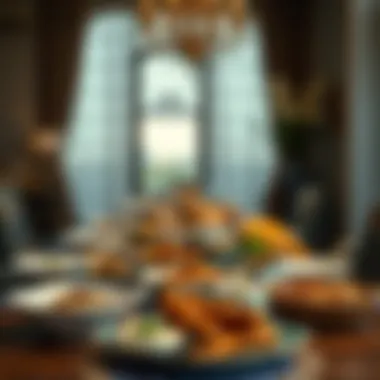

- Plant-based dished: Dishes featuring lentils, chickpeas, and vegetables are gaining popularity. These meals are not only hearty but also have a significantly smaller environmental impact compared to meat-based options.
- Compostable containers: Many eateries are making strides by adopting compostable takeout containers, ensuring that waste doesn’t linger in landfills.
- Water conservation: Instead of single-use plastic bottles, establishments are emphasizing reusable water dispensers. This not only cuts down on plastic but also encourages social interaction as diners refill their glasses at community stations.
This combination of conscious dining choices contributes to a richer, more meaningful Iftar experience, bringing together the act of breaking fast with a positive environmental impact.
Community Outreach Efforts
Beyond individual choices, community involvement plays a crucial role in promoting sustainability during Ramadan. Various organizations have joined forces to implement outreach programs focused on educating the public. These initiatives range from workshops to hands-on outreach, showcasing the importance of sustainable practices during Iftar.
One such effort includes food donation campaigns, where surplus meals from Iftar gatherings are collected and distributed to those in need. This not only helps tackle food wastage but also bridges the gap between different socio-economic groups within the city.
In addition to food donations, charity drives encourage residents to bring their reusable plates and utensils to community Iftars, fostering an ethos of reducing waste. This swap has not only led to less trash but has also cultivated a sense of camaraderie among participants, proving that sustainability doesn't have to be a solitary journey.
Importantly, these outreach programs reinforce the idea that sustainability is not a one-time initiative but an evolving practice that everyone can contribute to. As Dubai continues to modernize and expand, the collective efforts in cultivating sustainable minds will lay the foundation for a brighter future, opening up exciting possibilities for future Iftars and community engagement.
"Sustainability is not a choice but a necessity of high importance."
As the holy month unfolds, it's heartening to witness the marriage of tradition and modern sustainability practices taking root in Dubai's Iftar scene. From eco-friendly food options to proactive community efforts, the call for conscious practices rings clear, making the observance of Ramadan both an enriching and responsible endeavor.
Changes in Observation of Iftar in Urban Settings
Iftar, the evening meal to break the fast during Ramadan, is a sacred daily ritual for Muslims. In urban settings like Dubai, the way people observe iftar has undergone significant transformations over the years. These changes reflect not just shifts in cultural practices but also adaptations to the fast-paced city life. This section delves into the altering landscape of iftar observance, spotlighting how traditional customs are evolving in response to modern influences.
Shift in Traditional Practices
Historically, iftar was an intimate occasion, usually celebrated within the home, often involving family and close friends. The arrival of Ramadan was marked by communal gatherings, where each dish had its own significance, often passed down through generations. However, with Dubai's rapid urbanization and changing demographics, we witness a notable shift.
Modern life in a bustling metropolis can impose constraints on this deep-rooted tradition. Working hours and social dynamics have affected how many people can engage in these practices. It's not uncommon now for individuals to have iftar in the workplace or at organized events rather than at home. Moreover, the draw of restaurants offering special iftar menus has made dining out more popular, allowing people to enjoy a feast without the pressure of preparation.
This shift, while convenient, has implications for the cultural fabric of the city. Are people losing touch with the rituals associated with home-cooked meals? Or are they simply adapting those traditions to fit within a contemporary context? This delicate balance between maintaining heritage and embracing the modern lifestyle is at the core of the discussion around changing practices during iftar.
Adapting to Modern Lifestyles
Adapting to modern lifestyles is another dimension that influences iftar observance in Dubai. As expatriates and tourists flock to the city, the diversity of dining experiences has expanded exponentially. With this, the concept of what constitutes an iftar meal has broadened. While traditional dishes like dates and soup remain staples, many are now exploring innovative culinary fusions inspired by global cuisines.
Social media has also stepped in to shape these adaptations. Platforms like Instagram and Facebook showcase visually enticing meals, often leading to an increase in people dining out or ordering in for iftar. Beyond aesthetics, this visible celebration of breaking the fast has created a sense of community among people from various backgrounds.
Interestingly, the urban landscape of Dubai has also promoted new ideas about what it means to gather for iftar. Rooftop cafes, high-end restaurants, and outdoor markets transform the way families and friends interact during this sacred time. It’s less about strict adherence to tradition and more about conviviality and shared experiences in stunning environments.
As the city continues to evolve, so too does the observation of iftar. The blend of old and new, personalized and communal is what makes it so unique to urban centers like Dubai. The remaining challenge lies in ensuring that as these practices evolve, they retain the core values that Ramadan represents: patience, humility, and togetherness.
"The most beautiful aspect of iftar in a city like Dubai is that it brings people from various cultures together, reminding us that food has always been a universal language."
Given these shifts, whether one is a homebuyer, investor, or expatriate, understanding the nuances of iftar in urban settings is crucial. It not only enhances cultural appreciation but also informs future decisions around community engagement and real estate investments in the bustling cityscape of Dubai.
The End: The Future of Iftar in Dubai
As we draw the curtains on our exploration of iftar in Dubai during Ramadan 2023, it's essential to look ahead and contemplate the evolving landscape of this cherished tradition. Iftar is not just a meal; it's an experience that encapsulates the spirit of togetherness, gratitude, and cultural identity. With Dubai's dynamic environment, iftar is bound to adapt, blending the old with the new in meaningful ways.
Evolving Traditions
The essence of iftar continues to shift, much like the desert winds that shape the landscape of Dubai. While traditional practices hold a revered place, there's an unmistakable trend towards innovation.
- Modern Culinary Influences: In today’s fast-paced world, traditional iftar foods are being infused with contemporary culinary techniques. Local kitchens are experimenting with fusion dishes, merging Emirati spices with global flavors.
- Tech Integration: The rise of mobile apps that notify users of the precise iftar time is revolutionizing how families and communities gather. This incorporation of technology adds a layer of convenience, ensuring that families break their fast together, even if they're apart.
- Social Media's Role: Platforms like Instagram and TikTok provide a space for sharing unique iftar setups, culinary masterpieces, and home-cooked recipes. This not only enhances community bonds but also encourages cultural exchange, enriching the understanding of Ramadan's significance.
As these practices evolve, they reflect a society that honors its traditions while embracing the present.
Integration with Real Estate Trends
The intersection of iftar practices and the real estate market in Dubai is increasingly notable. Developers and real estate agents are taking stock of how community-oriented spaces cater to the observance of Ramadan.
- Community Support: New residential projects are designed with communal areas that foster gathering, such as rooftop terraces ideal for iftar gatherings. This reflects a growing understanding of the importance of community in the observance of Ramadan.
- Investment Opportunities: For investors, the popularity of these developments signals a profitable trend. Properties near popular iftar locations are likely to appreciate in value as the demand for shared cultural experiences grows.
- Sustainable Design: More builders are recognizing the importance of eco-friendly initiatives during Ramadan. Implementing sustainable practices in construction not only addresses modern concerns but also aligns with the values upheld during the holy month.

